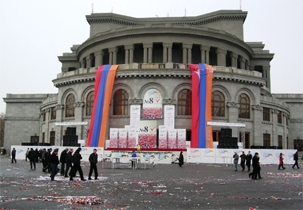– It is of utmost importance that these promises are followed up by action, says Bjørn Engesland, Secretary General of the Norwegian Helsinki Committee. Norwegian Helsinki Committee’s Lene Wetteland is in Armenia during the elections.
Armenia made several amendments to the Electoral Code in 2011, largely positively assessed by the Venice Commission and the OSCE/ODIHR. Together with the President’s repeated statements that free and fair elections are necessary for Armenia, latest at a rally on 28 April in Yerevan, there is a hope that the coming Parliamentary elections will be a step forward for the poor Caucasus republic. The test, however, lies in the implementation.
The acting President also the leader of the Republican Party which is now hoping for more representatives in the 131-member parliament. In the current period, five parties have been represented, with the Heritage Party and the Armenian Revolutionary Federation in opposition to the Republican Party, Prosperous Armenia and the Rule of Law Party. The party bloc of former President and runner-up presidential candidate in 2008 Levon Ter-Petrossyan, the Armenian National Congress, is aiming to enter the Parliament in these elections.
The lack of separation between state functions and the ruling party is of great concern in these elections as in the previous. On several occasions undue pressure has been put on voters who are working for public institutions like schools and hospitals. There are also reports of pressure to attend Republican Party rallies at the same time as employers warn their employees against attending rallies organized by for example the opposition Heritage party.
Another significant challenge is in regard to the voters’ lists. In a country known for its extensive emigration, just under 2,5 million voters are registered. However, the latest census has presented numbers around 2,8 million population, and the disparity between these numbers has been subject for discussion. Similarly, there are discussions on the purely technical aspects. For example, on 30 March, the independent Internet-based TV channel Civilnet.tv reported how 101 voters were registered in one apartment.
Local organizations are planning to monitor the elections, but are critical to the new regulations that demand that local observers sit an exam and acquire a diploma before they are allowed to monitor. The examination and test are organized by the Central Election Commission, and the NGOs are concerned that this requirement will open up for abuse at a later stage, though it seems most observers pass through this bureaucratic obstacle this time.
One NGO that is following initiatives elsewhere with regards to citizen participation in election observation is the organisation behind the website www.iditord.org. Here, regular citizens can register violations they face in all phases of election campaign, the voting and in response to complaints. So far, the website has registered 305 violations, mostly in the larger towns of Yerevan, Gyumri and Vanadzor.
-It is definitely positive that the government has followed recommendations and made several amendments to the Electoral Code, and that the President publicly speaks of the importance of free and fair elections, says Engesland. – However, the question is how this will be implemented in practice. More empty promises will add to the distrust in the political system and set a bad example for the coming elections in all the South Caucasus countries, he concludes.
